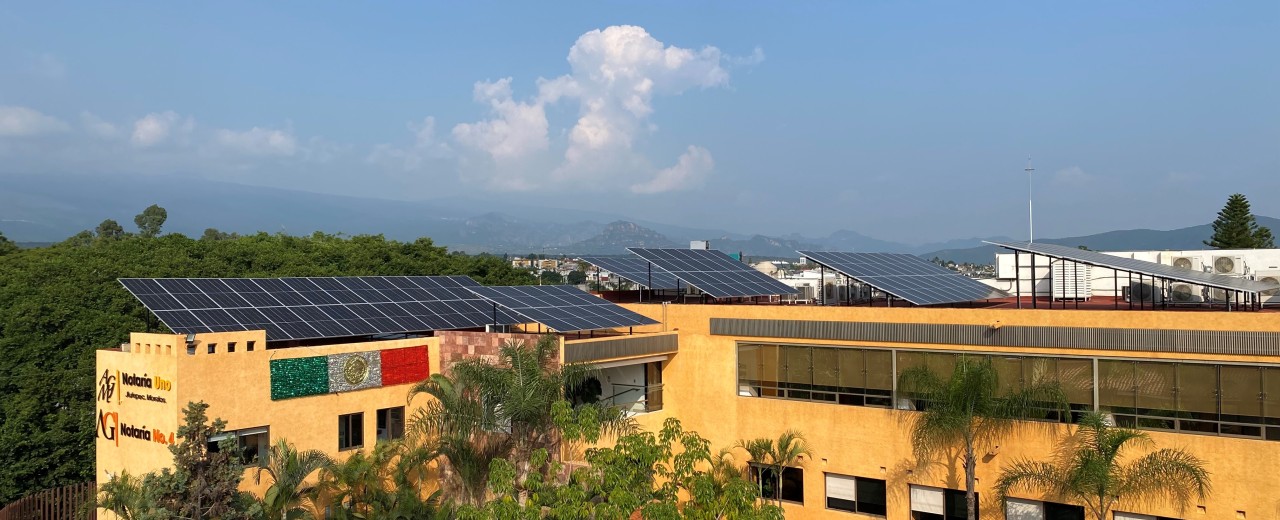
As of: 04/2024
Micro, small and medium-sized enterprises (MSMEs) are important pillars in the Mexican economy. However, their machines are often not equipped with the latest technology – cooling devices and motors consume more power than necessary. At the same time, MSMEs lack access to loans. This is why KfW, on behalf of the German Federal Government, is working with the Mexican development bank Nacional Financiera (NAFIN) to finance a programme that provides MSMEs with loans for modernisation work. Low-interest loans make the financing of energy-efficient electrical appliances and photovoltaic systems more attractive. This will help to reduce MSMEs' electricity consumption, which is currently disproportionately high, and thereby cut greenhouse gas emissions.
In terms of sectors, the energy sector is responsible for the largest proportion of Mexico’s greenhouse gas emissions. In 2023, more than 77% of the country’s electricity demand came from non-renewable sources of energy. The new President Claudia Sheinbaum, who has been in office since the end of 2024, defined the target that 45% of electricity generation should come from renewable energies by 2030. One approach is to modernise the operating equipment of MSMEs. With almost 4.7 million businesses, these account for around 99% of all companies based in Mexico. They make a huge contribution to the national economic performance – in 2022, they contributed around 52% to gross domestic product and employed close to 68% of all employees. These companies therefore drive the country's economy. At the same time, MSMEs are responsible for 14% of the country’s total energy consumption.
This is because they also often use outdated electrical equipment. Cooling appliances in particular are often not state of the art. In principle, purchasing energy-efficient equipment would be an attractive prospect given the comparatively high electricity prices, but there is a lack of suitable financing options and access to loans. Therefore, Mexican MSMEs are often forced to take out consumer loans at interest rates ranging between 27% and 41% p.a. to finance investments.
For this reason, the Mexican development bank, NAFIN, has worked with the non-profit Mexican Energy Saving Fund FIDE (Fideicomiso de Ahorro para la Energía Eléctrica) to launch the “Eco Crédito Empresarial” programme, which has been refinanced through development loans from the German Financial Cooperation since 2012. To date, KfW has supported the programme by offering three low-interest loans on behalf of the German Federal Government. In total, KfW has contributed more than EUR 124 million to the Energy Saving Fund so far.

The programme aims to promote energy efficiency and the generation of energy from sustainable and environmentally friendly sources in the MSME sector. This is to counteract the country’s increasing energy consumption and help MSMEs to operate more sustainably so that Mexico can achieve its climate targets. The programme is also supporting the Mexican government in its efforts to implement standardised energy saving investments in key technologies such as solar power systems.
KfW has been granting development loans to NAFIN since December 2018. These project funds are forwarded to the MSMEs via FIDE. The loans are then repaid through the electricity bill. This means there is little change to the amount charged in electricity bills, as the savings from the investment measures are used to repay the loan. After approximately three to five years, the entire loan will have been repaid and the companies will then benefit from significantly lower electricity bills. Installing a photovoltaic system can reduce electricity costs by up to 90%.
The programme uses a standardised approach to promote small-scale investment measures to reduce energy consumption and encourage the use of renewable energies in the MSME sector. Thirteen different technologies are currently supported. These include modern, energy-efficient commercial refrigerators and freezers, air conditioning systems, electric motors, solar water heaters, power transformers and photovoltaic systems. The list of eligible technologies has expanded over the years and is expected to continue to grow.
All in all, over 34,000 MSMEs have been reached and more than 50,000 energy-saving devices and solar power systems have been financed as part of the three project phases supported by KfW. The MSMEs most frequently used the favourable loans to finance photovoltaic systems as well as commercial refrigerators and air-conditioning systems. The project has also helped to deliver savings of more than 112,000 tonnes of carbon dioxide annually.
The Mexican Ministry of Economic Affairs and Energy strongly supports the project. Both ministries are providing funds that, on the one hand, guarantee repayment of the loans by MSMEs and on the other, guarantee reward schemes for scrapping obsolete equipment.
The project contributes to the achievement of these following United Nations Sustainable Development Goals:
KfW Group
KfW Development Bank
KfW Oficina de Representación in Mexico
Share page
To share the content of this page with your network, click on one of the icons below.
Note on data protection: When you share content, your personal data is transferred to the selected network.
Data protection
Alternatively, you can also copy the short link: https://www.kfw-entwicklungsbank.de/s/enzBy1Yi
Copy link Link copied